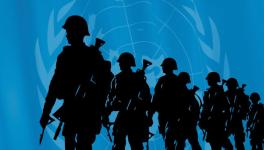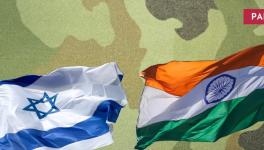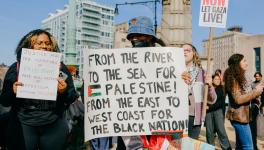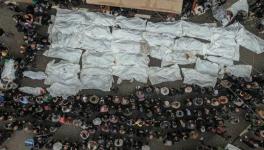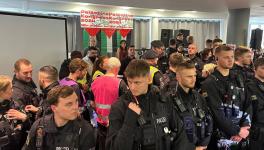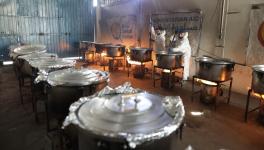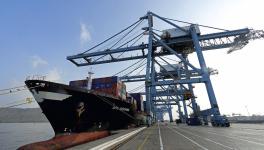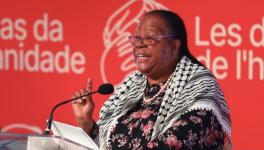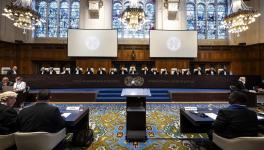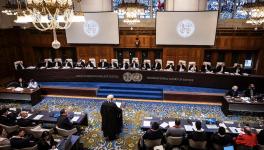Support Grows for South Africa’s Case Against Israel
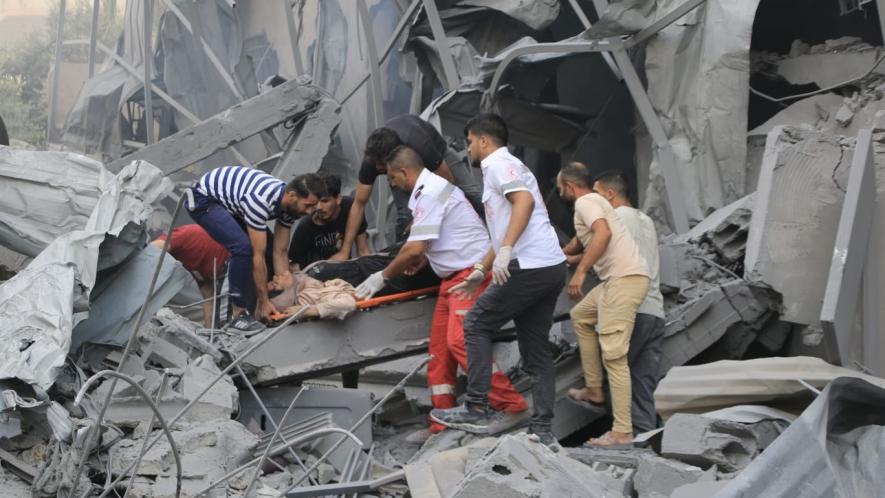
Mohammed Saqer via @PalestineRCS/X
Bolivia has joined the ranks of countries who support South Africa’s historic case against Israel at the International Court of Justice (ICJ) for the ongoing genocide in Gaza. The Hague is set to initiate public hearings on the matter on January 11.
In a statement on January 7, the Bolivian government recognized “that South Africa took a historic step in the defense of the Palestinian people, a leadership and effort that should be accompanied by the international community that clamors for the respect for life”.
Bolivia was among the countries, including South Africa and Bangladesh, who had submitted an appeal to the International Criminal Court (ICC) on November 17 to investigate the crimes being committed in Palestine, including genocide. The ICC is a separate entity, established under the Rome Statute, which oversees cases against individuals.
The ICJ is the judicial institution of the United Nations, and countries including Israel and South Africa are bound by the Court by virtue of their membership of the UN. The Court adjudicates disputes between countries and its decisions are legally binding. Israel and South Africa are also State Parties to the 1948 Genocide Convention, under which Pretoria has brought its lawsuit.
The historic step has been supported by other countries including Malaysia, which called it a “timely and tangible step towards legal accountability for Israel’s atrocities in Gaza and the Occupied Palestinian territories at large”.
Turkey and the Organization for Islamic Cooperation (OIC) have similarly backed the case, with the 57-member bloc stating that it has “affirmed that the indiscriminate targeting by Israel, the occupying power, of the civilian population and the thousands of Palestinians…killed, injured, forcibly displaced, and denied basic necessities…in their totality constitute mass genocide.”
Meanwhile, Jordan, which signed a peace treaty with Israel 30 years ago, has announced that it will support South Africa at the ICJ, including by preparing necessary legal documents.
On January 8, over 900 popular movements, political parties, unions, and other organizations called upon states across the world to file a “Declaration of Intervention” in support of South Africa’s application at the ICJ.
“If a majority of the world’s nations call for a ceasefire, yet fail to press for prosecution of Israel – what is to stop Israel from ethnically cleansing all Palestinians?… For that matter, what is to stop other nations from repeating a horror of this magnitude?”
The case against Israel
Israel’s bombardment of Gaza has entered its fourth month, killing over 22,900 Palestinians and injuring over 58,000. At least 7,000 people are unaccounted for, presumed to be dead and still buried under the rubble.
Given the “ongoing, extreme, and irreparable harm being suffered by Palestinians in Gaza”, Pretoria has called on the ICJ to issue emergency measures, including ordering Israel to immediately cease its military operations in and against Gaza as well as all genocidal acts as outlined in the application. The hearings beginning on Thursday pertain to these provisional measures.
In the 84-page application submitted to the court, South Africa emphasizes the obligation of all State Parties to the 1948 Convention to take “all reasonable measures within their power to prevent genocide”. As such, it has urged the Court to recognize that Israel has breached this obligation.
“The acts and omissions by Israel…are genocidal in character because they are intended to bring about the destruction of a substantial part of the Palestinian national, racial, and ethnic group,” it argued, as defined under Article II of the Convention on the Prevention and Punishment of the Crime of Genocide.
The acts include killing Palestinians in Gaza in large numbers; causing serious bodily and mental harm; and inflicting on them conditions of life intended to bring about their destruction as a group— which includes mass expulsions, the deprivation of food, water, medical care, and shelter, the destruction of life of the Palestinian people, and the imposition of measures intended to prevent Palestinian births.
Read more: South Africa takes Israel to ICJ for crime of genocide in Gaza
While evidence of these conditions is presented in meticulous detail in the application, South Africa has highlighted that in order to indicate provisional measures, the Court is not required to determine whether Israel has violated the Genocide Convention. Instead, it needs to establish whether the acts described are capable of falling under the convention’s provisions.
The proceedings
South Africa will present its arguments before 15 judges of the ICJ on January 11. Additionally, both South Africa and Israel have each nominated a judge to the panel. Pretoria has nominated Dikgang Moseneke, the former Deputy Chief Justice of the Constitutional Court of South Africa.
Meanwhile, the country’s legal team at the Hague will be led by John Dugard SC. He is a leading international law and human rights lawyer and has previously served as the UN Special Rapporteur on the Human Rights situation in the Occupied Palestinian Territories and led two UN commissions investigating Israel’s violation of international law. He has also served as an ad-hoc judge at the ICJ.
Other senior members of the team include Adila Hassim, who has dealt with prominent cases related to socio-economic rights including access to health services; legal scholar and lawyer Tembeka Ngcukaitobi, who led several high profile cases against former South African president Jacob Zuma and recently represented a coalition of unions and civil society groups to challenge widespread power blackouts in South Africa; and Max Du Pleiss, a barrister and professor of law at the University of KwaZulu Natal, dealing with cases related to human rights and international law.
The team, which also includes other lawyers from South Africa, will be accompanied by British lawyer, Vaughan Lowe, who had previously represented Palestine at the ICJ in a 2003 case seeking an advisory opinion on Israel’s construction of the apartheid wall isolating the occupied West Bank. In its ruling in 2004, the ICJ had declared that the wall, including in and around East Jerusalem, was illegal.
The second external counsel is Irish lawyer Blinne Ní Ghrálaigh. She has previously been involved in an inquiry into the 1972 Bloody Sunday massacre perpetrated by British soldiers. Ghrálaigh recently also represented one member of the “Colston Four”, a group of activists who were acquitted for tearing down the statue of a 17th century English slave trader, Edward Colston, in Bristol.
Israel is scared
Meanwhile, on January 7, Ofer Cassif, a member of the Israeli Knesset from the Hadash-Ta’al party (a joint platform of the Arab Movement for Renewal party and Hadash political coalition) announced that he would be joining the case against Israel.
Israel had instantly rejected South Africa’s case, deflecting from the crimes its political leadership has publicly sanctioned by raising accusations of the anti-Semitic trope of “blood libel”. Its chief weapons supplier and imperialist backer, the US called the case “meritless” and “counterproductive”.
However, Israel will be participating in the proceedings, presenting its statement before the ICJ on January 12. Its defense team will be led by Malcolm Shaw, a British lawyer and professor with expertise in international law, who has reportedly provided legal advice and assistance to Israel several times in the past.
The Occupation has also nominated Aharon Barak, a prominent jurist and the former President of the Supreme Court of Israel, to the court’s panel of judges.
In Israeli media the decision shows “that the Israeli government believes that it [the case] is such a serious legal and image problem” that it has nominated someone “it has labeled as one of its greatest opponents”, a reference to Barak’s opposition to the judicial reforms proposed by the Netanyahu government and criticisms of Benjamin Netanyahu.
However, for legal experts and observers, he is the “epitome of judicial complicity”, a “diplomat judge” who served as “Israel’s public defender abroad”.
“This is the man who turned the concept that Israel can also maintain an endless (“long-term” occupation, in his language), while massively depriving the Palestinians of their rights, dignity, property and land, and also remain democratic, into a legal doctrine,” wrote Sikha Mekomit (or Local Call), a Hebrew language news outlet.
In an interview with The Globe and Mail in November, Barak said, “I agree totally with what the government is doing”, and “It may be proportional to kill five innocent kids in order to target their leader”, talking in the context of the bombings of Gaza.
Reports have also emerged of tensions within the Israeli military and political establishment ahead of the hearings. Major General Yifat Tomer-Yerushalmi of the IDF wrote a letter warning that the ICJ case “increases risks for senior officials at the political level and in the IDF”.
While intent is considered to be the most difficult factor to prove in a charge of genocide, South Africa’s submission documents statements made by nine members of government, including Prime Minister Benjamin Netanyahu and President Isaac Herzog, six military officials and decision-makers, as well as statements by occupation soliders, all of which indicate a “clear intent to destroy Palestinians in Gaza as a group “as such”.
Israeli officials warned in meetings that “The talks about erasing and flattening Gaza by irresponsible politicians were not answered with the required intensity by the official authorities”. At the same time, such genocidal statements have in no way ceased.
Just last week, Moshe Saada, a Knesset member from Netanyahu’s Likud Party spoke of a growing understanding in Israel that “all Gazans need to be destroyed”, stating “[i]t is clear to everyone today, that the right wing is right in the matter of politics, in the matter of Palestinians”.
Given that an outright denial of genocidal intent seems impossible in this context, Israel is reportedly preparing its arguments for the ICJ by telling the court that “Some of those quoted [in the application] are not decision makers, the ones that are— didn’t mean what they said.”
Meanwhile, according to a report in Axios, the Israeli foreign ministry sent out a cable directing its embassies abroad to pressure political leaders and diplomats to issue statements against South Africa’s case. “A ruling by the court could have significant potential implications that are not only in the legal world but have practical bilateral, multilateral, economic, security ramifications,” the cable states.
The foreign ministry has also called for emphasis to be placed on Israel’s efforts to “increase humanitarian aid to the population in Gaza” and decrease the number of civilian casualties, which the cable states “is critical”.
Where these “efforts” have materialized remains to be seen given that Israel, on January 8 in a period of 24 hours, had massacred 249 Palestinians and injured over 500.
In a speech late last week, the UN’s humanitarian chief, Martin Griffiths warned that “famine is around the corner” in Gaza, with people facing the highest levels of food insecurity ever recorded.
“Gaza has simply become uninhabitable. Its people are witnessing daily threats to their very existence– while the world watches on.”
Get the latest reports & analysis with people's perspective on Protests, movements & deep analytical videos, discussions of the current affairs in your Telegram app. Subscribe to NewsClick's Telegram channel & get Real-Time updates on stories, as they get published on our website.









